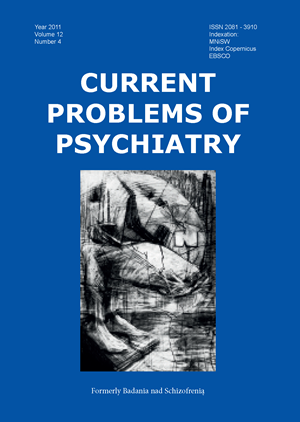Social support
Keywords:
social support, kinds, classificationAbstract
The concept of social support has long been used in contexts of problematic situations, crises, difficult and traumatic events, as one of elements of seeking help and the mechanisms of health and disease. Recently it has been used in analyzing the problems of stress and ways of coping with it. Social support is one of the elements of psychosocial resistance resources, known as the properties of individuals and groups that are necessary to cope with difficult situations and as a consequence - to achieve an optimal state of adaptation. Mere fact of having social support, as an interactive resource, stemming from the outside, is not synonymous with the ability to cope with problems and maintaining health. There is a need of readiness of the individual and her own activity to its causative use and processing. A number of difficulties in giving clear definition of this phenomenon have a multifaceted character. They are dictated by the genesis of dealing with social support inherent in man's practical experience, and derived from natural need to help others.
References
1. Sęk H., Cieślak R. Rola wsparcia społecznego w sytuacjach stresu życiowego. O dopasowaniu wsparcia do wydarzeń stresowych. W: Sęk H., Cieślak R. red. Wsparcie społeczne, stres, zdrowie. Warszawa: Wyd. Naukowe PWN; 2005. s. 49-67.
2. Kirenko J., Byra S. Zasoby osobiste w chorobach psychosoma-tycznych. Lublin: Wydawnictwo UMCS; 2008.
3. Włodarczyk D. Wsparcie społeczne a radzenie sobie ze stresem u chorych po zawale serca. Przegl. Psychol., 1999; 4: 95-113.
4. Kawula S. Wsparcie społeczne – kluczowy wymiar pedagogiki społecznej. Problemy Opiekuńczo – Wychowawcze 1996; 1: 12-16.
5. Kurowska K., Frąckowiak M. Wsparcie społeczne a radzenie sobie w przewlekłej chorobie na przykładzie cukrzycy typu 2. Diabet. Prakt., 2010; 11(3): 101-107.
6. Sęk H. O wieloznacznych funkcjach wsparcia społecznego. W: Cier-piałkowska I., Sęk H. red. Psychologia kliniczna i psychologia zdro-wia. Poznań: Wydawnictwo Fundacji Humaniora; 2001. s. 13-32.
7. Leyk M., Książek J., Stangiewicz M. Rodzina jako źródło wsparcia społecznego dla osób z wyłonioną kolostomią. Probl. Piel., 2010; 8(1): 41-46.
8. Kurowska K., Rudewicz E., Głowacka M., Felsmann M. Poczucie koherencji a wsparcie społeczne u osób ze schorzeniami wieku starczego. Psychogeriatria Pol., 2008; 5(4): 165-172.
9. Antonovsky A. Rozwikłanie tajemnicy zdrowia. Jak radzić sobie ze stresem i nie zachorować. Warszawa: Wydawnictwo Naukowe IPN; 2005.
10. Grochans E., Wieder – Huszla S., Jurczak A., Stanisławska M., Janic E. Wsparcie emocjonalne jako wyznacznik jakości opieki pielęgniarskiej. Probl. Hig. Epidemiol., 2009; 90(2): 236-239.
11. Hebel K., Bieniaszewski L. Wsparcie społeczne i pomoc instytucjonalna dla osób po udarze mózgu. Forum Med. Rodz., 2008; 2(1): 76-83.
12. Taylor S.E. Psychologia zdrowia: nauka i praktyka. Nowiny Psychol., 1992;1: 37-56.
13. Cieślak R., Eliasz A. Wsparcie społeczne a osobowość. W: Sęk H., Cieślak R., red. Wsparcie społeczne, stres i zdrowie. Warszawa: 2005. s. 68-89.
Downloads
Published
Issue
Section
License
Copyright (c) 2011 Authors

This work is licensed under a Creative Commons Attribution-NonCommercial-NoDerivatives 3.0 Unported License.


